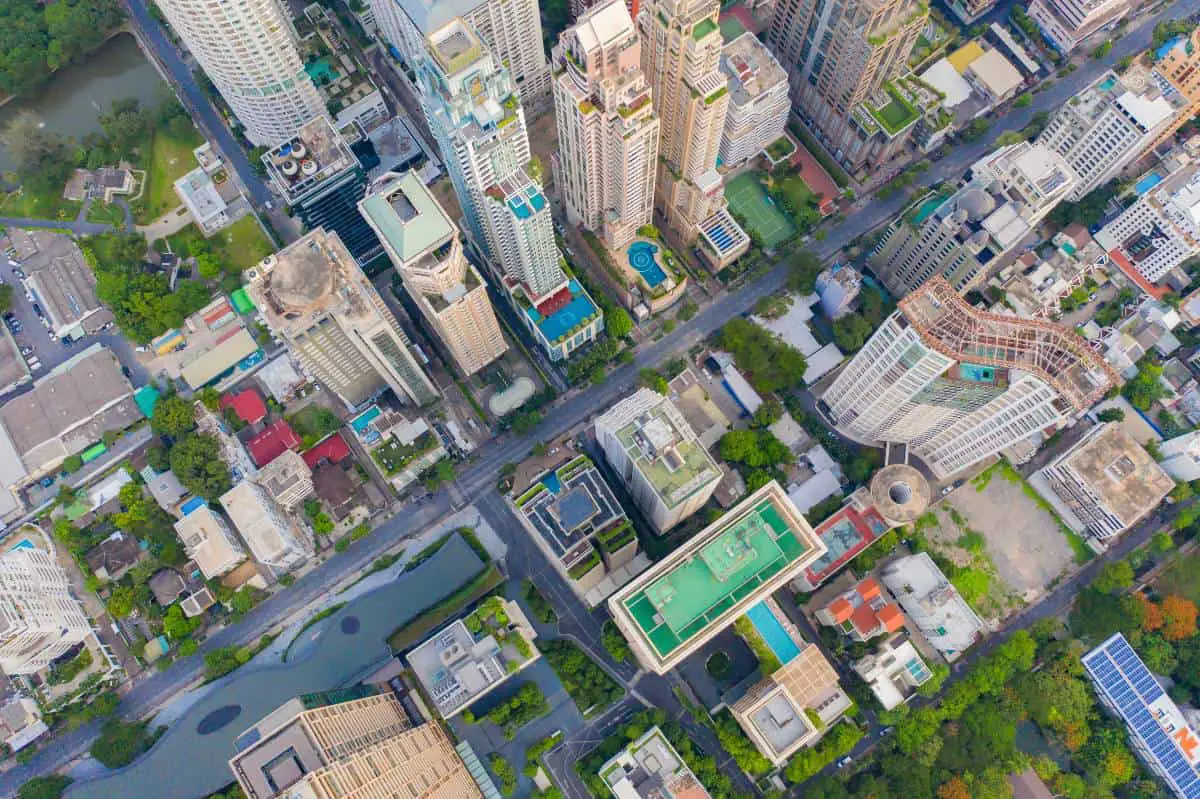Expat Guide: Must-Know Property Trends Thailand 2026
Having spent over three decades in Thailand after 35 years in the US, I’ve had a front-row seat to the incredible transformation of the Thai real estate market. Whether I’m sipping coffee at a trendy Bangkok cafe or relaxing on a Phuket beach, I still marvel at how the property landscape has evolved. Today, I’m excited to share what’s happening in Thailand’s real estate market for 2026 – from the surge in foreign investment to the game-changing infrastructure projects reshaping cities. Let me break down what these trends mean for investors and expats looking to make Thailand their home.
Key Takeaways
- Thailand is experiencing significant growth with a projected CAGR of 5.41%, making it a prime location for real estate transactions.
- Foreign ownership regulations are evolving, with proposed increases in condominium foreign ownership caps
- Tourism recovery is driving real estate demand, with 41.1 million visitors expected in 2026
Economic Fundamentals Shaping the Market
The Thai market is currently riding a wave of positive economic indicators. Based on my experience and recent market analysis, we’re looking at a market that’s not just recovering – it’s thriving.
Economic Growth and Market Dynamics
Thailand’s economy demonstrates remarkable resilience, with projections indicating a With a projected 13.1% growth over the next five years, the real estate information center is a valuable resource for potential investors.. This isn’t just a number – it represents increasing purchasing power, growing business opportunities, and expanding real estate demand.
From my observations, this economic expansion is particularly visible in urban centers like Bangkok, where new office spaces and residential developments are rapidly emerging to meet growing demand. The average GDP growth rate of 2.6% annually signals sustainable, steady growth rather than volatile spikes, which is exactly what property investors should look for.
Strategic Investment Climate
The real estate sector benefits significantly from the government’s proactive approach to economic management. The policies of the Bank of Thailand have created a stable investment environment, with carefully regulated interest rates that support both developers and buyers. I’ve seen how this stability has attracted not just individual investors but also major international development companies, particularly from Singapore, Hong Kong, and Japan.
Inflation and Property Values
The IMF’s projection of a 1.0% inflation rate over the next 5 years is particularly significant for property investors. This controlled inflation rate, averaging just a 0.2% annual increase, creates an ideal environment for real estate investment, aligning with the demand for real estate.
- Property values tend to appreciate above inflation rates
- Mortgage costs remain predictable
- Rental yields maintain their real value
- Construction costs stay stable, encouraging new development
Tourism’s Economic Impact
The tourism sector’s recovery is proving to be a major economic driver. This surge in tourism has multiple effects on the market:
Recovery and Growth Projections
The tourism sector’s remarkable recovery is reshaping Thailand’s property market dynamics. With projections showing 41.1 million visitors expected back in 2025, surpassing pre-pandemic levels, we’re witnessing a significant transformation in property prices and demand patterns. In my 30 years here, I’ve rarely seen such a strong correlation between tourism growth and real estate opportunity.
Direct Market Impact
The surge in tourism is creating compelling opportunities in the real estate sector. I’m seeing increased demand for short-term rental properties, particularly in prime tourist locations like Phuket, Pattaya, and Chiang Mai. Property values in these areas are responding positively, with beachfront condominiums and resort-style developments experiencing notable appreciation. Investors who positioned themselves early in these markets are now seeing substantial returns.
Hospitality Real Estate Trends
The hospitality sector is undergoing an exciting evolution. Boutique hotels, serviced apartments, and mixed-use developments are emerging as preferred investment choices. From my recent consultations with investors, I’ve noticed a growing interest in properties that can serve both the tourist market and long-term residents. This flexibility in usage is becoming a key factor in investment decisions.
Infrastructure Development
Tourism growth is catalyzing significant infrastructure improvements, which are crucial for the property market in Thailand. New airports, expanded transport networks, and enhanced urban facilities are being developed across major tourist destinations. I’ve watched as areas like Phuket’s west coast and Koh Samui transform through these improvements, creating new property investment hotspots along the way.
Employment and Local Market Dynamics
The tourism revival is creating a ripple effect in local property markets. Job creation in the tourism sector is driving demand for residential properties, particularly in emerging tourist destinations. I’m observing increased interest in staff housing developments and mid-range condominiums catering to tourism industry professionals.
Foreign Investment Patterns
Tourist familiarity with Thailand often translates into property investment. I’ve helped numerous clients who first visited as tourists and later returned as property investors to buy real estate in Thailand. This pattern is particularly strong among visitors from China, Hong Kong, and Singapore, who often start by looking at house prices for holiday homes before expanding their investment portfolios.

Long-term Market Sustainability
The sustainable growth in tourism numbers is creating a more stable market environment. Unlike the speculative bubbles of the past, current growth in the property market is backed by real demand and improving fundamentals, making Thailand an attractive option for investors. This stability is crucial for long-term investors looking for sustainable returns in the Thai property market.
Foreign Direct Investment
The market has seen a notable uptick in foreign buyer interest, particularly following recent regulatory changes. The government’s Eastern Economic Corridor (EEC) initiative has proven especially successful in attracting international companies. This has led to increased demand for commercial real estate, growing expatriate housing needs, and the development of supporting infrastructure, reflecting current market trends.
Employment and Property Demand
The current employment rate of 67.36% is helping maintain a robust real estate market. This has resulted in stable demand for residential properties, consistent performance in the rental market, and expanding middle-class property aspirations.
Market Size and Growth Projections
Market analysis indicates a healthy CAGR of 5.41% during the 2024-2029 forecast period. This growth trajectory is supported by multiple factors including ongoing urbanization trends, continued infrastructure development, increasing disposable incomes, and steady foreign investment flows.
Market Outlook
Based on experience through multiple economic cycles in Thailand, current market fundamentals represent an exceptionally favorable environment for property investment. The convergence of stable inflation, strong tourism recovery, and supportive government policies creates compelling opportunities for both domestic and international investors.
Market Evolution: A Historical Perspective
Having witnessed Thailand’s property market evolution over three decades, I’ve seen transformative changes that have shaped today’s landscape. Let me take you through this fascinating journey and where we stand in 2024, highlighting the latest market trends.
The Foundation Years (2011-2012)
The early 2010s marked a pivotal moment within the real estate market in Thailand. The government introduced groundbreaking tax cuts for first-time buyers, fundamentally changing market accessibility. I witnessed the Bank of Thailand implement soft loans with surprisingly favorable interest rates, which created a ripple effect throughout the market.
This period was particularly noteworthy as established developers began venturing beyond Bangkok, transforming places like Chiang Mai and Phuket into thriving property and housing markets.
Market Maturation (2015-2016)
By mid-decade, the market had entered a more sophisticated phase. The Thai Government Housing Bank’s progressive policies transformed property ownership accessibility, particularly for middle-income buyers. Their introduction of 30-year loan terms and reduced registration fees created unprecedented opportunities for property ownership. I remember how these changes energized the market, leading to a surge in first-time buyers and property investments.
Pre-Pandemic Stability (2018-2019)
The late 2010s saw the implementation of crucial credit controls that would later prove vital during economic challenges. The Thai government’s foresight in introducing stricter lending criteria and new tax initiatives for first-time buyers helped create a more stable market foundation. These measures, though sometimes seen as restrictive, ultimately protected the market from overheating.
Pandemic Impact and Recovery (2019-2021)
The pandemic years tested our market’s resilience like never before. I observed firsthand how property developers and investors adapted to unprecedented challenges. The introduction of the Thai Elite Visa program during this period was a masterstroke, helping maintain foreign investment interests despite global uncertainty. The market’s ability to weather this storm demonstrated its fundamental strength.
Current Market Renaissance (2023-2024)
Today’s market shows remarkable vitality, with foreign investment reaching new heights. We’re seeing a fascinating diversity in our international buyer profile – Chinese investors dominating condominium purchases, Japanese firms leading joint ventures, and Singaporean buyers focusing on premium properties. American investors, interestingly, tend to prefer larger units, reflecting different cultural preferences and investment strategies.
2024 Regulatory Evolution
The current regulatory environment represents the most significant shift I’ve seen in decades, impacting prices in Thailand. The proposed increase in foreign ownership caps from 49% to 75% for condominiums is revolutionary. Even more exciting is the potential extension of land lease terms from 30 to 99 years.
These changes, combined with new investment requirements for foreign buyers, are creating a more sophisticated and accessible market for international investors.
2025 Market Dynamics
The year 2025 has marked a transitional period where many of the proposed 2024 reforms began taking shape. We’re observing how the market has adapted to new foreign ownership regulations, with developers restructuring projects to accommodate the evolving legal framework. The extended lease terms have particularly energized the villa market, attracting long-term investors who previously hesitated due to the 30-year limitation.
I’ve noticed a shift in buyer sentiment—there’s increased confidence among foreign investors, knowing their property rights extend across generations. Additionally, 2025 saw refinements in the foreign buyer investment requirements, with clearer guidelines that have streamlined the purchasing process and reduced regulatory uncertainty. The market rebounded with residential transactions forecasted to rise by 3.7%, and property prices showing a 3.49% year-on-year increase in Q1 2025.
Future Trajectory (2026-2029)
Looking ahead, the market’s growth trajectory appears robust. With current valuations at USD 54.90 billion and projections reaching USD 71.70 billion by 2029, we’re witnessing unprecedented expansion. The market is adapting to changing demographics, with developments increasingly catering to an aging population while maintaining appeal for younger buyers and international investors.
In my decades of experience, I’ve never seen the Thai property market better positioned for growth. The combination of mature regulations, strong foreign interest, and adaptable development strategies suggests we’re entering a new golden era for Thai real estate. Whether you’re a first-time buyer or a seasoned investor, understanding this evolution in the property market in Thailand is crucial for making informed decisions in today’s market.
Current Development Trends
Mixed-Use Projects
The landscape of Thai real estate is evolving with integrated developments becoming increasingly prevalent. These projects combine residential, retail, and office spaces, particularly in Bangkok’s CBD and emerging business districts, indicating a robust demand for real estate. From my observation, this trend reflects changing lifestyle preferences and urbanization patterns.
Sustainable Development
Environmental consciousness is reshaping property development in Thailand. Modern projects increasingly incorporate green spaces, energy-efficient designs, and eco-friendly materials. This shift isn’t just about environmental responsibility – it’s becoming a key factor in property valuation and marketability.
Regional Market Analysis
Bangkok Market Dynamics
The capital continues to lead market innovation with impressive developments in both traditional and emerging areas. Mass transit systems’ expansion creates new property hotspots, while established areas maintain their premium status. I’ve seen neighborhoods transform dramatically as infrastructure improvements drive property values upward.
Tourist Destination Properties
The resort markets of Phuket and Pattaya are experiencing a renaissance, particularly in the luxury segment. These areas offer unique investment opportunities, combining strong rental potential with lifestyle benefits. The return of international tourism is further strengthening these markets.
Investment Outlook
The current market presents a balanced mix of opportunities and considerations. Strong rental yields in prime locations continue to attract investors, while infrastructure development drives long-term value growth. However, investors should remain mindful of market oversupply in certain segments and keep abreast of regulatory changes.
FAQs
What are the current trends in the Thai property market for 2024?
Is it a good time to buy real estate in Thailand in 2024?
What types of properties are popular among foreign buyers in Thailand?
How does the housing market in Thailand compare to other Southeast Asian countries?
What are the regulations regarding transfers of residential property rights in Thailand?
Conclusion
The future of Thailand’s property market looks bright, with strong fundamentals, growing tourism, and evolving regulations creating exciting opportunities for investors and homebuyers alike. But I know making property decisions – especially in a foreign country – can feel overwhelming. That’s why we’re here to help you navigate every step of the way in your real estate transactions.
Questions about living, working, or retiring in Asia? Whether you’re just starting to explore the idea or ready to make the move, we’re here to help. With decades of experience and a network of experts, we can guide you through your journey to a better life in Asia. Message us today to start the conversation.






